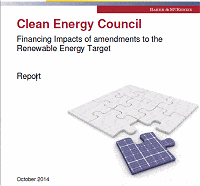Any reduction to the Renewable Energy Target could result in a massive legal and financial mess according to a new report.
Analysis by law firm Baker & McKenzie for the Clean Energy Council reveals a number of concerning prospects should the government succeed in slashing the RET.
Among them, a reduction will likely be the catalyst for a review of existing funding arrangements for projects by lenders; resulting in the cost of capital for equity being higher. Any adverse financial impacts on renewable energy operators and developers could result in a slew of legal challenges – and the pursuit of compensation.
“This report shows that a cut in the target of the scale proposed by the government would have far reaching and damaging consequences, and also that ensuring adequate compensation would be an extraordinarily complex and expensive task,” said Clean Energy Council Acting Chief Executive Kane Thornton.
“A retrospective change to the policy would result in financial impairment and a substantial risk that existing projects and businesses would collapse, as well as inflicting damage on Australia’s reputation as a safe place to invest.”
The Baker & McKenzie draws attention to a major oversight in the Warburton Review.
“The RET Review Report fails to recognise that a lower RET target is likely to suppress merchant REC prices to such an extent that the bundled merchant price is well below breakeven price for operators and financially unattractive for any new owners.”
One REC (Renewable Energy Certificate) is equivalent to one megawatt hour of electricity generation. The value of these certificates fluctuates according to market conditions.
Should the government get its way, REC prices are generally expected to fall on average by between 10% – 30%; creating a risk that projects may not be able to meet their debt servicing obligations.
With more than $10 billion worth of investment having already been made in large scale renewable energy projects based on a 41,000 GWh target, the government now finds itself in very dangerous waters with its aspirations.
The report, “Financing Impacts Of Amendments To The Renewable Energy Target”, can be viewed in full here (PDF).







































